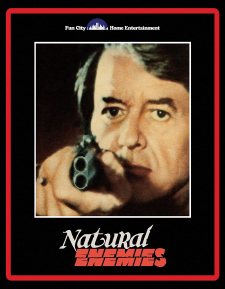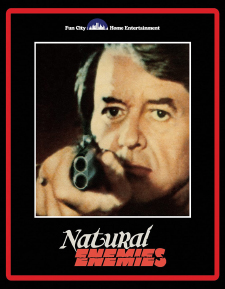Natural Enemies (Blu-ray Review)

Director
Jeff KanewRelease Date(s)
1979 (September 27, 2022)Studio(s)
Utopia/Cinema 5 Distributing (Fun City Editions/Vinegar Syndrome)- Film/Program Grade: B+
- Video Grade: B
- Audio Grade: B
- Extras Grade: B+
Review
In writer/director/editor Jeff Kanew’s Natural Enemies, Paul Steward (Hal Holbrook) calmly announces his intentions to shoot his wife Miriam (Louise Fletcher), his three children, and finally himself. That’s not a spoiler; it’s spelled out during the opening scene—and it was also the front cover tagline for the paperback version of the Julius Horowitz novel on which the film is based. In Kanew’s adaptation, we hear Paul’s plans in voiceover while he stares impassively out the window of the bedroom where he sleeps separately from his wife. He then sits down and calmly loads his rifle before going about his daily business. How that day will end remains an open question throughout the film, but the bleak, hopeless tone leaves little room for optimism.
Natural Enemies is a naked cry of despair, thinly veiled behind a veneer of middle-class repression. Paul’s voiceover continues as he goes through the formality of what he intends to be his last day on Earth, giving us insights into why he has made this decision. We’re also shown flashbacks of the kinds of things that have led to his despondency, including Miriam’s mental breakdown. As the film progresses, however, the voiceovers and the insights become fewer and farther between. Paul doesn’t really have a character arc in Natural Enemies, because he’s already reached the end of it.
Horowitz’s book had a somewhat ambiguous ending, in that it provided a final glimmer of hope, but also pulled the rug out from under that hope. The reader was left to choose what seemed most appropriate. Kanew initially mirrored the structure of Horowitz’s ending, while muting the hopeful details (at Holbrook’s insistence), but he ended up creating ambiguity of his own by cutting a different ending that left things slightly more open ended—very slightly, but still somewhat open to interpretation. The New York premiere used his original version, but the print that played in Los Angeles was the altered one. Yet the tone of the film as a whole simply doesn’t feel particularly equivocal, so the New York ending feels more appropriate. It’s the only one that’s been used ever since.
Natural Enemies wasn’t the kind of subject matter for a debut feature that would necessarily lead to many offers from Hollywood, even during the freewheeling Seventies, and the financial failure of the film certainly didn’t help. Kanew never made another film like it, and he ended up becoming best known for comedies like Revenge of the Nerds, Tough Guys, and Troop Beverly Hills. Yet while Natural Enemies may be a product of its times, sadly it has only become more and more relevant in the decades since it was made—it’s even harder to watch now than it ever was before. That’s especially true given the fact that Louise Fletcher just passed away, but Natural Enemies is still a testament to her endless gifts as an actor. Holbrook is equally superb in the film. If this description hasn’t already been abundantly clear, Natural Enemies deals openly with self-harm as well as harm to others, so it won’t be for everyone. Yet for those who can handle the themes, it’s an unforgettable look not just at the dissolution of a marriage, but also of the dissolution of existence itself.
Cinematographer Richard E. Brooks shot Natural Enemies on 35 mm film using spherical lenses, framed at 1.85:1 for its theatrical release. This version of the film was taken from a 2K scan of the 35 mm copyright deposit print at the Library of Congress, so there are understandable limitations to the end results. There’s some light damage like speckling and scratches, as well as occasional heavier scratches, and even a few dropped frames. There’s also some instability, especially during the opening credits, and moments where the density fluctuates. The contrast range is fine overall, though there’s not much detail in the darkest parts of the frame, where everything tends to wash out. The color balance is good, with accurate-looking flesh tones, and while the grain is moderately heavy, it’s not obtrusive. Despite the inevitable flaws of the source element that was used, this is still a natural-looking and filmic presentation of Natural Enemies, faithful to what it would have looked like when it was originally screened theatrically.
Audio is offered in English 2.0 mono DTS-HD Master Audio, with optional English SDH subtitles. There’s just a touch of excessive sibilance in some of the dialogue, but it’s otherwise clear, and noise is kept to a minimum. The brooding, ominous score from Don Ellis sounds fine, though the fidelity is naturally a bit limited. (It was the final score that Ellis composed before his untimely death at the age of 44, and it’s a shame that his work here has never been released as a soundtrack album.)
The Fun City Editions Blu-ray release of Natural Enemies includes a reversible insert with artwork inspired by the original RCA/Columbia VHS cover on one side, and new artwork by Tony Stella on the reverse, as well as a 12-page booklet with an essay by Jason Bailey. There’s also an embossed and spot gloss slipcover available directly from Vinegar Syndrome, limited to the first 2,000 units, designed by Stella. The following extras are included, all in HD:
- Introduction by Jeff Kanew (2:11)
- Audio Commentary by Bill Ackerman
- The Road to Natural Enemies Part I (23:19)
- The Road to Natural Enemies Part II (44:19)
- Alternate Ending (1:58)
- Theatrical Trailer (1:58)
The commentary track features Bill Ackerman of the Supporting Characters Podcast, who provides and overview of the financing, production, and release of Natural Enemies, as well as biographical information about Kanew and the actors. He compares the final film to Horowitz’s novel, notes the connections to Bergman’s work like Scenes from a Marriage, and also places the film into context with Seventies New York cinema. He even helpfully points out an error on IMDb, which is a good sign that he did real research before recording the track. (There are plenty of other commentaries out there that freely repeat errors from IMDb or Wikipedia.) Ackerman talks about the mixed critical reaction, reading from some of the reviews, and looks at the way that the financial failure of Natural Enemies led to Kanew’s career taking a very different turn into comedies like Revenge of the Nerds.
The brief Introduction with Kanew is selected when playing the film, not as a part of the extras menu. The Road to Natural Enemies is a two-part interview with Kanew, derived from the same sessions that were used for the Introduction. The first part is mostly autobiographical, with Kanew giving his background in cutting trailers and editing films before making his move into directing. He even describes his experiences helming the low-budget adult film Mail Order Confidential. The second part focuses on the production of Natural Enemies, with Kanew offering some eye-opening stories, especially when he describes a particular bit of direction that he had to give to Holbrook for the brothel scene. Kanew and Holbrook actually didn’t see eye to eye, especially in regards to the ending, and Holbrook also ended up conflicting with Fletcher. Kanew is a lively and uninhibited speaker, so these are enjoyable interviews. The Alternate Ending is the L.A. version of the finale, which actually consists of the exact same footage, but without the final voiceover, and with a fade to black instead of a freeze-frame on Holbrook’s face.
Natural Enemies may seem like a strange title to be released by a company with a name like Fun City Editions as this is the polar opposite of fun, but it’s still perfectly in keeping with the kinds of offbeat or forgotten repertory films that Fun City has in the rest of their catalogue. Considering that Natural Enemies hasn’t been available on home video since its original VHS release (legitimately, anyway), this Blu-ray is a major coup for the company. The fact that it includes some solid extras certainly doesn’t hurt, but the real star of the show is this neglected but very worthy film. For all of us who lament the passing of the late great Louise Fletcher, it’s an absolute must-buy.
- Stephen Bjork
(You can follow Stephen on social media at these links: Twitter and Facebook.)

